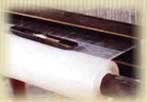 The country's premier fiber
has come a long way from its
humble beginning as raw
material for our ancestor's
coarse and stiff clothing as
well as footwears and
slippers. While the abaca is
still being used for these purposes up to the present time. Its application has expanded and improved remendously, going beyond simple fibercraft to sophisiticated industrial uses. Aside from the traditional cordage application, the fiber is now a superior and important material in the pulp and specialty paper industries and is used in the manufacture of tea bags, meat/sausage casings, cigarrette paper, filter papers, currency notes, stencil papers and a host of non-woven product applications. The country's premier fiber
has come a long way from its
humble beginning as raw
material for our ancestor's
coarse and stiff clothing as
well as footwears and
slippers. While the abaca is
still being used for these purposes up to the present time. Its application has expanded and improved remendously, going beyond simple fibercraft to sophisiticated industrial uses. Aside from the traditional cordage application, the fiber is now a superior and important material in the pulp and specialty paper industries and is used in the manufacture of tea bags, meat/sausage casings, cigarrette paper, filter papers, currency notes, stencil papers and a host of non-woven product applications.
Abaca, scientifically known as Musa textils nee, is indigenous to the Philippines whose warm, wet climate and volcanic soils are particlurly suited to its cultivation. It has been grown in the Philippines for centuries and was known to the Filipinos long before the Spanish occupation.
|
|